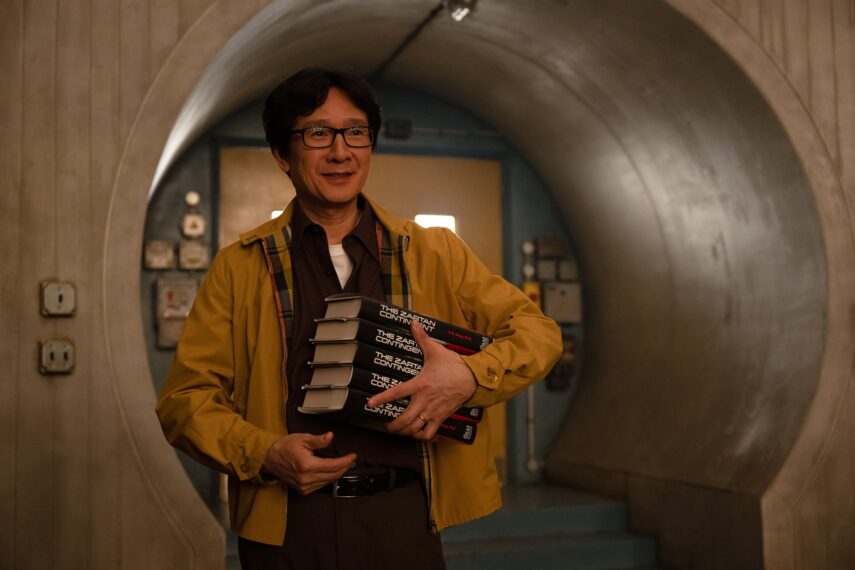‘Loki’ Writer Explains God’s Time-Slipping Powers & Who May Have Sparked It

[Warning: The below contains MAJOR spoilers for Loki, Season 2, Episode 5, “Science Fiction.”]
Loki‘s second season delivered its most mind-bending episode yet as the God of Mischief (Tom Hiddleston) was forced to solve a seemingly insolvable problem, which was to control his time slipping.
After Episode 4’s cliffhanger, which saw Loki and the team fail to repair the broken loom, keeping the various timelines under control, Victor Timely (Jonathan Majors) was spaghettified in an explosive flare-up, suggesting the end was nigh. But Loki finds himself transported in Episode 5, alone in the TVA; he loops back to himself before time-slipping out of the space that’s beginning to spaghettify around him.
He ends up traveling in and out of various timelines, crossing paths with Mobius (Owen Wilson), who is a jetski salesman; Don, O.B. (Ke Huy Quan), who is a sci-fi writer and Ph.D. qualified scientist; Casey (Eugene Cordero) who is an Alcatraz escapee, and Hunter B-15 (Wunmi Mosaku) who is a pediatrician living in New York City in the year 2012. The only catch? None of them know who Loki is, and he’s forced to explain the situation as best he can to try and fix the crumbling realities. Throughout, Loki is also asked to try to control his time slipping by O.B., who believes that’s the key.

(Credit: Gareth Gatrell /© 2023 MARVEL)
Loki also travels back to McDonald’s, where he finds Sylvie (Sophia Di Martino), who is the only one to remember him. The pair have a candid conversation at a bar, where Loki’s forced to face the fact that he’s selfish because he wants to maintain the found family he’s created since being taken into the TVA. Sylvie tries explaining to Loki that he can’t decide people’s fates, but she soon learns that her decision to give everyone free will by killing He Who Remains (also Majors) has consequences as her branched timeline begins to spaghettify as she listens to The Velvet Underground’s “Oh! Sweet Nuthin’” on a record player.
Using He Who Remains’ TemPad, Sylvie travels to where Loki has gathered the team, but even that reality begins to fray until Loki’s the only one standing. Reaching out to Sylvie’s receding form, Loki pleads, “No,” before he yells out, and time slips back a few seconds. Realizing what he’s done, he tries again and has results, bringing him back to the group just moments before they all disappear. Loki declares he can “rewrite the story,” knowing that the secret to controlling his time-slipping is about who he’s time-slipping to in the first place. By the end of the episode, he puts himself back to the moment at the TVA where the temporal loom begins to explode upon Victor’s death.
What this means moving forward, writer Eric Martin can’t say much, but he did open up about Loki’s newfound control over time slipping, potential for him as the God of Stories in the MCU, and much more. Read on below.

(Credit: Gareth Gatrell /© 2023 MARVEL)
At the end of the episode, Loki declares he can “rewrite the story” after realizing he can control his time slipping. Is that an indication we’re heading towards the God of Stories transformation?
Eric Martin: I don’t want to give people an indication either way on that specifically. I will say that everything he’s saying matters, everything that he and Sylvie are saying matters, and I think that’s all pertinent on a lot of different levels.
Fans have strong opinions when it comes to relationships on this show. When Loki realizes he can control his time slipping, he says it’s not about the what, why, and where; it’s about the “who.” Is there a specific “who” that triggers this power, or is he referencing everyone he cares about in that statement?
No, no, I think it’s A and B, right? I think it’s both or all of the above because this is Loki’s found family, right? And they dematerialize before his very eyes, and he’d already had that realization that this is why he’s been doing it. Because of them. He needed them, he wanted them, and then they don’t even get to go back to their lives. Everything falls apart. He’s lost everything, and then Sylvie is the last… she’s the capper on that. I think that’s meaningful. I think they have a deep connection, and that’s the final thing of like, “Oh, I lose her too?” Everything is gone. He’s lost it all. And I think it’s the totality of that that comes together, and it just gives him that power. He centers, and he can do the thing now.
When Loki travels back to find his friends on their timelines, Sylvie does remember him, unlike Mobius, B-15, Casey, and O.B. Is that just because she’s a Loki variant, too?
Yeah, I mean, I think Sylvie says it herself, it’s like, “No, you idiot. I’m a God, too.” Yeah, they operate under different rules.

(Credit: Gareth Gatrell /© 2023 MARVEL)
You go back into all these timelines and meet the TVA team in a new light, along with Mobius getting his jet ski moment! Were all of these backstories pre-determined? Which was the most fun to write?
So, I think all of those from the initial conception of the episode stayed exactly how they started, except for Casey. What we wanted to do with Casey was something surprising. He’s so sweet and meek, and we wanted a tough guy. We wanted something totally different for him. There was a slightly different version where Loki wanders into a biker bar, very much like Terminator 2, and Casey is like this lead biker and a total tough guy, and ultimately we decided like, let’s do something a little bit different, and took that same kind of tone of Casey and put him into Alcatraz. That was a lot of fun. Eugene’s such a great guy, and just imagining him doing all of this made me laugh. O.B., for me, was the most enjoyable stuff to write. I loved writing the titles of his sci-fi books, and I think there’s just something funny and sweet about his whole story with that and just Ke reading all that. It’s just perfect.
Speaking of O.B., this poor guy writes books no one seems to read, both in the TVA and in the timeline. Both the TVA handbook and The Zartan Contingent have important information, though. Will they play a larger role down the line? Or is this just an Ouroboros effect at play?
So, for me, I think you see it across the different characters too, is that you can take people out of their place, but they’re still who they are. And so no matter where you put him, he’s going to be a scientist, and he’s going to be a writer, and those are the things that are just going to come out, and that’s what that’s about. It’s all character. Those are the things he cares about. He loves his work at the TVA, but his TVA handbook stuff, that’s probably the stuff he’s most proud of, and it just felt right to have it be this way.
One timeline I have to ask about is B-15’s. It’s New York City in 2012, which is a big one for the MCU. Was that purposeful?
I think it’s intentional, and I think it’s just a thread that can go somewhere. I can’t speak to the plan for B-15 and Wunmi going forward. I hope they use her because Wunmi is just the absolute best, and I love B-15, but I think it’s about leaving an open-ended thread that can maybe behold if the MCU wants to.
When it comes to time-slipping, you really can go anywhere. Is this show staying within the timeline fans have come to know or going further back beyond the moment Loki was taken into the TVA?
I will tell you in one week [Laughs].
Loki, Season 2, Thursdays, 9/8c, Disney+




